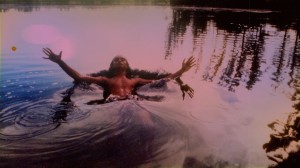JACO

It might be a bit of a cliché to say musicians are a special breed of people because they share in the language of music, but to understand this notion is to understand a tribe of kindred spirits most comfortable on that astral plain where only musicians tread. Once you can appreciate that, the loss of the ability to communicate through music for one of these people becomes heartbreaking. It happened to Jaco Pastorius after he redefined the limitations of what the bass guitar could do and played arenas with jazz fusion groups like Weather Report. His story, which began and ended in Wilton Manors, Florida, is nothing short of a tragedy.
With Jaco, co-directors Paul Marchand and Stephen Kijak follow the classic formula of a documentary focused on an influential creative person gone too soon. There are talking heads, from musicians who worked with him, like Joni Mitchell, Herbie Hancock and Wayne Shorter, to admirers like Sting, Flea and Juan Alderete from The Mars Volta who says, “He’s our Hendrix.” There is also a lot of vintage footage, including plenty of home videos and photographs. Though the directors follow Pastorius’ life chronologically, they also frame it around his creative ethos while dropping in sly reminders of his tragic mental illness.
 The film opens with a scene of Pastorius in his destitute later years, interviewed on television, around 1983 or ’84, by famed bassist Jerry Jemmott. Jemmott bestows Pastorius with praise on his influence on music and other bass players. When Jemmott asks him how he feels about being such an influence, Pastorius, who mostly stares down at his battered, scratched up bass perched on his lap, looks up and says, “Give me a gig, you know.” Cut to Jemmot reflecting on this meeting from the current day. He describes Pastorius as someone desperate to communicate and work again after a massively successful tour of Japan that ended with a decent into drugs and alcohol and erratic behavior. It’s the right kind of sad dynamic to set up a movie that refuses to gloss over the flaws of its talented subject.
The film opens with a scene of Pastorius in his destitute later years, interviewed on television, around 1983 or ’84, by famed bassist Jerry Jemmott. Jemmott bestows Pastorius with praise on his influence on music and other bass players. When Jemmott asks him how he feels about being such an influence, Pastorius, who mostly stares down at his battered, scratched up bass perched on his lap, looks up and says, “Give me a gig, you know.” Cut to Jemmot reflecting on this meeting from the current day. He describes Pastorius as someone desperate to communicate and work again after a massively successful tour of Japan that ended with a decent into drugs and alcohol and erratic behavior. It’s the right kind of sad dynamic to set up a movie that refuses to gloss over the flaws of its talented subject.
It’s the directors’ sensitivity to Jaco’s personal turmoil and clear admiration of him as an artist that allows the film to be more than a chronological tale of tragedy. Mitchell and others talk about the conversational quality of playing with Pastorius, and the camera hardly lingers on faces, intercutting beautiful, aged 8mm color home movies or photos of Pastorius with his families, from childhood to fatherhood. Early in the film, you see vintage footage of late 1950s and early ‘60s South Florida, where Pastorius grew up. Pastorius credits the music scene of the area as a key influence. In a voice over, he says, “I grew up in Florida where there was no real musical prejudice. There was all sorts of music, everything from Cuban music, to symphonic music.”
 Though he was a visionary sponge, Pastorius was a strange person, even early in his life. When interviewees reflect on his talent, small character quirks become reference points. Randy Emerick, who played saxophone with Wayne Cochran and the C.C. Riders, gives a vivid sketch of what Pastorius was like in his early years. He says Pastorius was so thin that he couldn’t fit in a tuxedo so he wore it over his clothes. He says Jaco would use his Fender bass case as his suitcase for the few articles of clothes he brought on tour. He also notes Pastorius would hardly spend his gig earnings. After getting paid, Emerick says, Pastorius would order the cheapest thing on the menu, usually a hot dog, and send the rest of his money, which he would store in his socks, home.
Though he was a visionary sponge, Pastorius was a strange person, even early in his life. When interviewees reflect on his talent, small character quirks become reference points. Randy Emerick, who played saxophone with Wayne Cochran and the C.C. Riders, gives a vivid sketch of what Pastorius was like in his early years. He says Pastorius was so thin that he couldn’t fit in a tuxedo so he wore it over his clothes. He says Jaco would use his Fender bass case as his suitcase for the few articles of clothes he brought on tour. He also notes Pastorius would hardly spend his gig earnings. After getting paid, Emerick says, Pastorius would order the cheapest thing on the menu, usually a hot dog, and send the rest of his money, which he would store in his socks, home.
The film soon goes into his invention of the fretless bass that helped him create his unique, harmonic sound. In an early sequence Bobby Colomby of Blood Sweat and Tears praises Pastorius’ cover of the jazz standard Donna Lee. The filmmakers overlay Pastorius’ version on top of Charlie Parker’s version as an example. “He played it with the facility and phrasing and nuance as a saxophone player,” notes Colomby.
 Pastorius’ inventiveness is set up as another instance of his practicality. His younger brother notes that the birth of Jaco’s first child made him declare that he needed to find a way to do something new and different to support his family. Indirectly Jonas Hellborg of Mahavishnu Orchestra happens to note, “We are influenced by life … that’s what comes out in music.” It’s a loaded statement because it also references the psychology of Pastorius. There are many instances in the film that show Pastorius projecting his persona through music. It reveals how cockiness informs creativity and how the “musical conversation” can become mean-spirited and abusive. He silenced Mitchell with his antics, stopped drummers’ extended fills by throwing his bass at them and fought passionately with his mentor in Weather Report, keyboardist Joe Zawinul, through call and response solos.
Pastorius’ inventiveness is set up as another instance of his practicality. His younger brother notes that the birth of Jaco’s first child made him declare that he needed to find a way to do something new and different to support his family. Indirectly Jonas Hellborg of Mahavishnu Orchestra happens to note, “We are influenced by life … that’s what comes out in music.” It’s a loaded statement because it also references the psychology of Pastorius. There are many instances in the film that show Pastorius projecting his persona through music. It reveals how cockiness informs creativity and how the “musical conversation” can become mean-spirited and abusive. He silenced Mitchell with his antics, stopped drummers’ extended fills by throwing his bass at them and fought passionately with his mentor in Weather Report, keyboardist Joe Zawinul, through call and response solos.
You cannot sell short the producer credit by Metallica bassist Robert Trujillo, who clearly understands the psychology of this tragedy, beyond Jaco’s psychiatric diagnosis. Metallica shared some of their psychotherapy sessions in a 2004 documentary, Some Kind of Monster. Jaco takes a similar perspective in dwelling on the musician’s state of mind, except that Jaco’s subject is the tragic, worst case scenario: destitution, homelessness, institutionalization and finally death. And the undercurrent of Pastorius’ decline always looms over the proceedings. But Jaco never feels like myth-making, just a genuine heartfelt tribute to a damaged but uniquely talented musician. Weather Report saxophonist Wayne Shorter says it best, “The sound of music being played is really the greatness of the human being.”
Jaco had its Florida premiere at the 30th Annual Fort Lauderdale Film Festival, earlier this month, where it won the Documentary Special Jury Prize. It returns for a short run at the Cinema Paradiso Fort Lauderdale, from Nov. 26 – 30. In Miami, it plays for one night only on Nov. 30 at O Cinema Miami Beach. It will be released on home video Nov. 27.
~ Hans Morgenstern | The Independent Ethos (indieethos.com)










